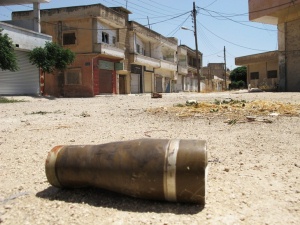
ICT Preparation in Syria
Despite restrictions, the humanitarian community is working together to provide IT and telecoms services in and around Syria
"The situation in Syria is catastrophic and getting worse by the day," UN Secretary General Ban Ki-moon said recently at a pledging conference in Kuwait. "Syrians face a cascading catalogue of horrors."

Mass demonstrations that started in Syria two years ago have morphed into a civil war that has devastated the lives of civilians. Over 70,000 have been killed and more than 6.5 million are in need of urgent assistance. Predictably, the humanitarian response has been enormous: refugee camps have been set up in Turkey, Jordan, Lebanon, Iraq and Egypt; food and vouchers are being distributed to ensure those affected have enough to eat; shelter, blankets and clothes are being handed out to ensure refugees can withstand the biting winter cold.
The Emergency Telecommunications Cluster (ETC) was activated in Syria on 14 January to provide common security and data communications services to the humanitarian community responding to this escalating crisis. The World Food Programme (WFP) was designated lead agency within Syria and is responsible for coordinating and supporting the ICT response of the humanitarian community on the ground.
Responsibility for providing ICT services across common operational areas in the region has been split between the ETC and the UN Refugee Agency (UNHCR). Both WFP and UNHCR are responsible for providing ETC services with WFP focusing on support within Syria.
As Rami Daqaq, Senior ICT Assistant for UNHCR in Syria, says "One of the most important aspects of inter-agency cooperation right now is to combine equipment requests for the authorities."
The ETC is acting as the focal point for the licensing and importation of equipment for the humanitarian community to streamline prepositioning. "It's much better to have one representative," says Rami. "It's more efficient than doing things separately."
Regular ETC meetings, both locally and at the global level, provide a forum for those involved in the ICT response to this emergency to share information and identify ways to coordinate and cooperate in the field. The NGO, Save the Children has partnered with WFP inside UNHCR refugee camps and host communities in Jordan to provide vital IT support for WFP food and voucher distributions.
"For General Food Distributions, WFP and Save the Children use computers and barcode scanners to check the ration cards received by UNHCR," says Moayyad Fares, IT System Officer for Save the Children in Jordan. "I train staff how to use the scanners and the UNHCR website that allows aid workers to check the ration cards."
In an extremely volatile and fast moving situation, such collaboration among humanitarian organizations is essential to maximise impact on those in need.
The ETC and the humanitarian community are carrying out vital work in Syria, however the security situation has prevented full-scale deployment of equipment and services. Extensive preparedness activities are currently underway; the procurement and prepositioning of critical equipment and the development of tracking procedures mean that when the security situation improves, services currently being provided can be rapidly expanded.
By Salma Farouque, ETC Syria